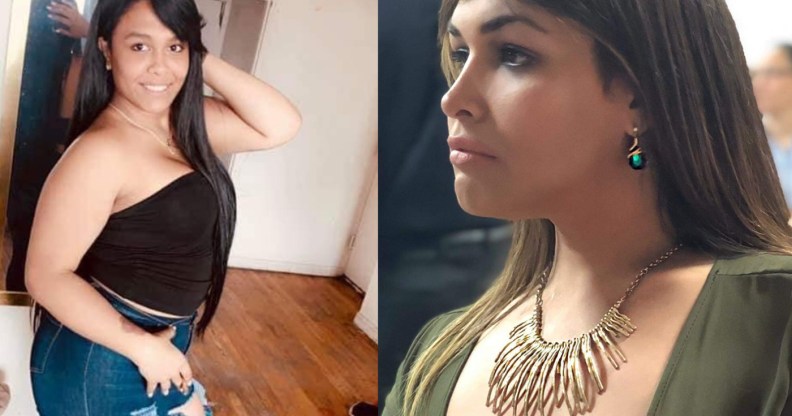Bodies of two brutally murdered trans women found in a burned out car in Puetro Rico. Activists warn: ‘They’re hunting us’

Layla Pelaez Sánchez (L) and Serena Angelique Velázquez Ramos (R), two trans women murdered in Puerto Rico (Facebook/Human Rights Campaign)
The bodies of two murdered trans women have been found in a burned out car in Puerto Rico, prompting activists to warn that they are being hunted.
Layla Pelaez Sánchez, 21, and Serena Angelique Velázquez Ramos, 32, were found dead in Sánchez’s car. They were both living in New York but had recently returned to Puerto Rico, the The New York Times reports.
Their deaths make them the seventh and eighth trans or gender non-conforming people killed in the United States so far this year.
Shockingly, four of the eight murdered trans people were killed in Puerto Rico, leading activists to warn of an epidemic of violence in the territory.
“They are hunting us,” said Pedro Julio Serrano of the Broad Committee for the Search for Equity, according to NBC News.
Police in Puerto Rico said they were waiting on DNA results before they officially named Ramos and Sánchez as the victims, but they have been publicly identified by human rights groups.
Police have confirmed that the women were killed but have not yet confirmed the cause of death and are waiting on autopsy results.
Human Rights Campaign mourned the loss of two trans women in Puerto Rico.
Sánchez and Ramos’s deaths have been met with an outpouring of grief and sadness from LGBT+ activists and organisations.
In a statement, director of community engagement and the transgender justice initiative at the Human Rights Campaign (HRC) Tori Cooper said said they are mourning “alongside the loved ones of Serena and Layla”.
“Serena and Layla, like us all, had family, dreams, hopes – and they did not deserve to die,” Cooper said.
“Transgender and gender non-conforming people, especially women of colour, are too often the victims of a toxic mix of transphobia, racism and misogyny.
“People and policy must work together to protect our lives and our well-being. HRC stands in solidarity with all who knew and loved them.”
Ivana Fred of El Comité Amplio para la búsqueda de la Equidad (CABE), a Puerto Rican LGBT+ organisation, said: “We are asking the police to thoroughly, immediately, and transparently investigate these vile and atrocious murders of Serena Angelique Velázquez and Layla Pelaez.
Serena and Layla, like us all, had family, dreams, hopes – and they did not deserve to die.
“There have been four murders of trans people in less than two months. First it was Alexa, then Yampi, and now Serena and Layla. Enough is enough.
“Trans people deserve to live in peace, with equity and freedom,” Fred added.
The women’s bodies were discovered when a passer-by noticed a burned out car on a quiet road in Humacao, which is on the eastern coast of Puerto Rico. The passer-by alerted emergency services.
Captain Teddy Morales, chief of criminal investigations for police in Humacao, refused to identify the women’s deaths as a possible hate crime.
“I can’t just say this is a hate crime from the scene,” Morales told The New York Times. “We need to know who killed them, why did he kill, and what were the motivations to say this was a hate crime.”
They are the third and fourth transgender people murdered in the territory so far this year.
Police are currently investigating images posted on social media the night before they were found dead, which showed the two women partying at one of their homes with two unidentified men.
The women were identified when Layla’s grandmother, who raised her, was watching the news. When the burned out car was shown, she immediately recognised it as belonging to her granddaughter and alerted police.
Sánchez and Ramos’s killings come after two more trans people were killed in Puerto Rico in February and March.
In February, Neulisa Luciano Ruiz, a homeless trans woman, was shot dead after she used a bathroom in a McDonald’s restaurant.
The following month, trans man Yampi Méndez Arocho was killed – and was subsequently misgendered by police.
Trans people face disproportionate levels of violence across the world, with trans women of colour worst affected.

